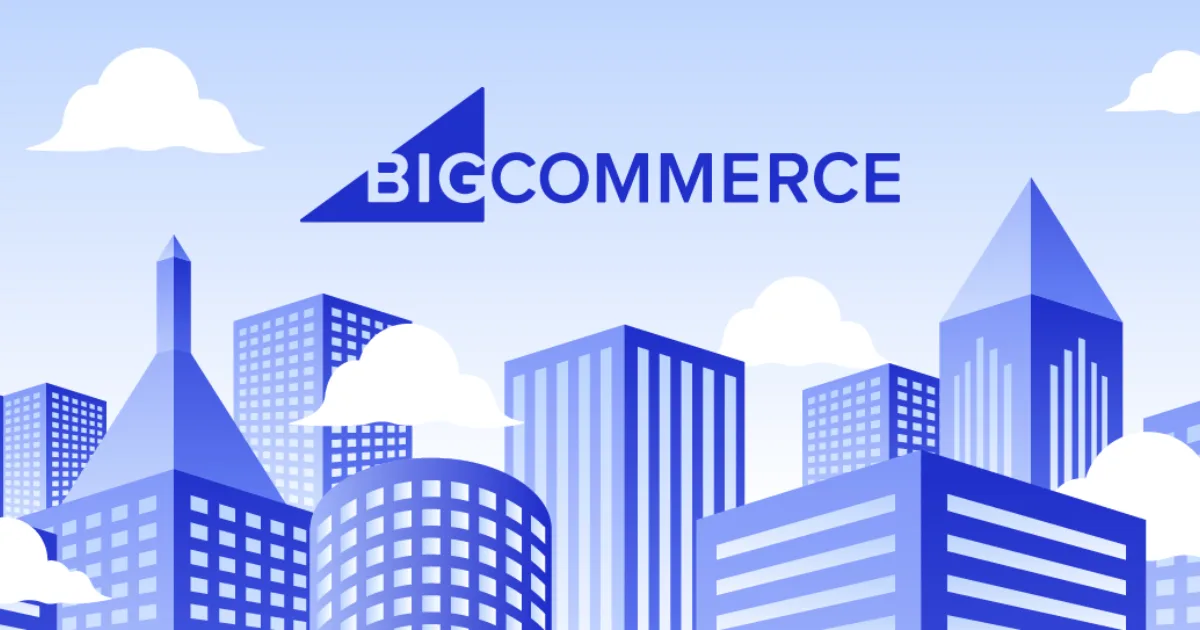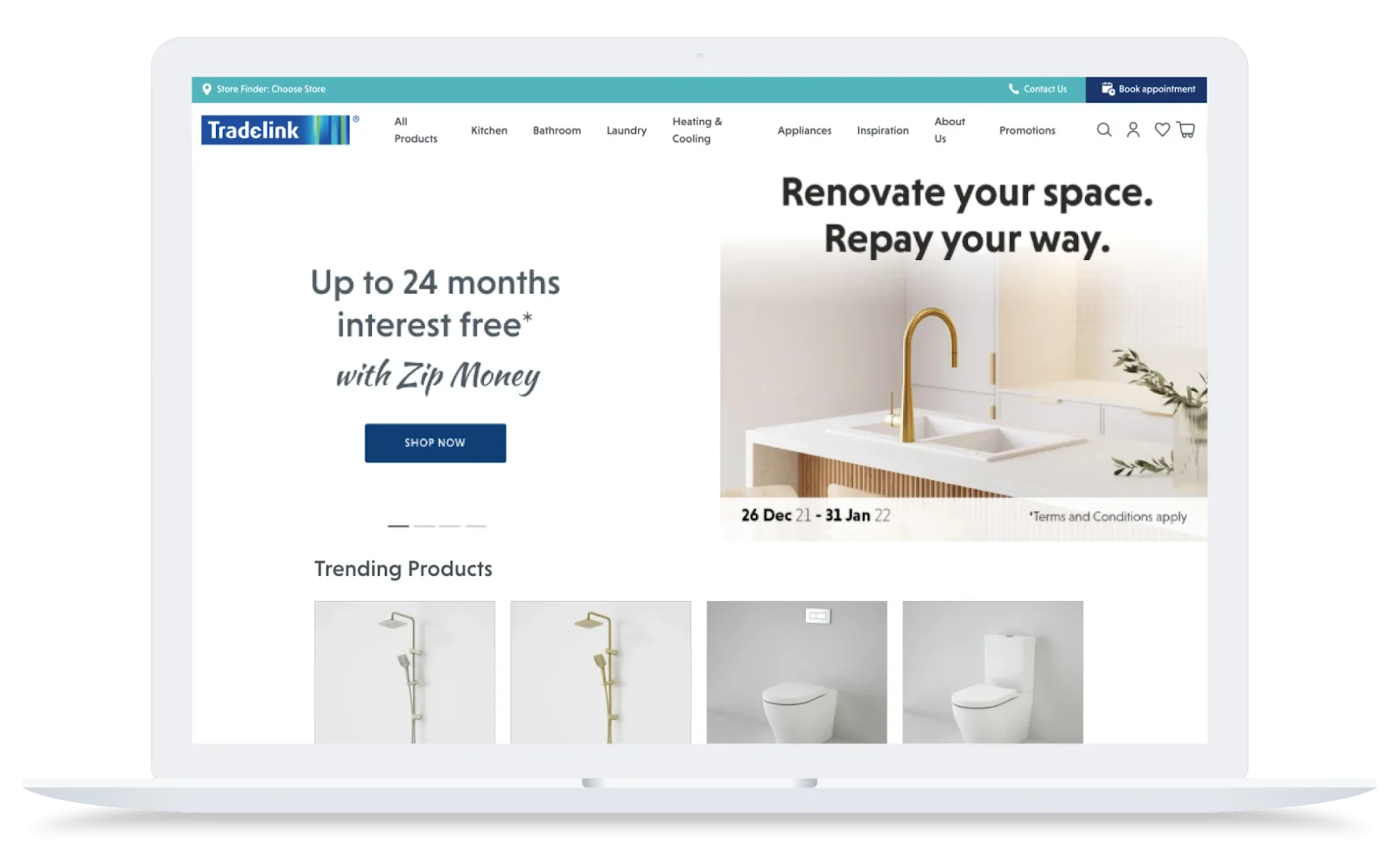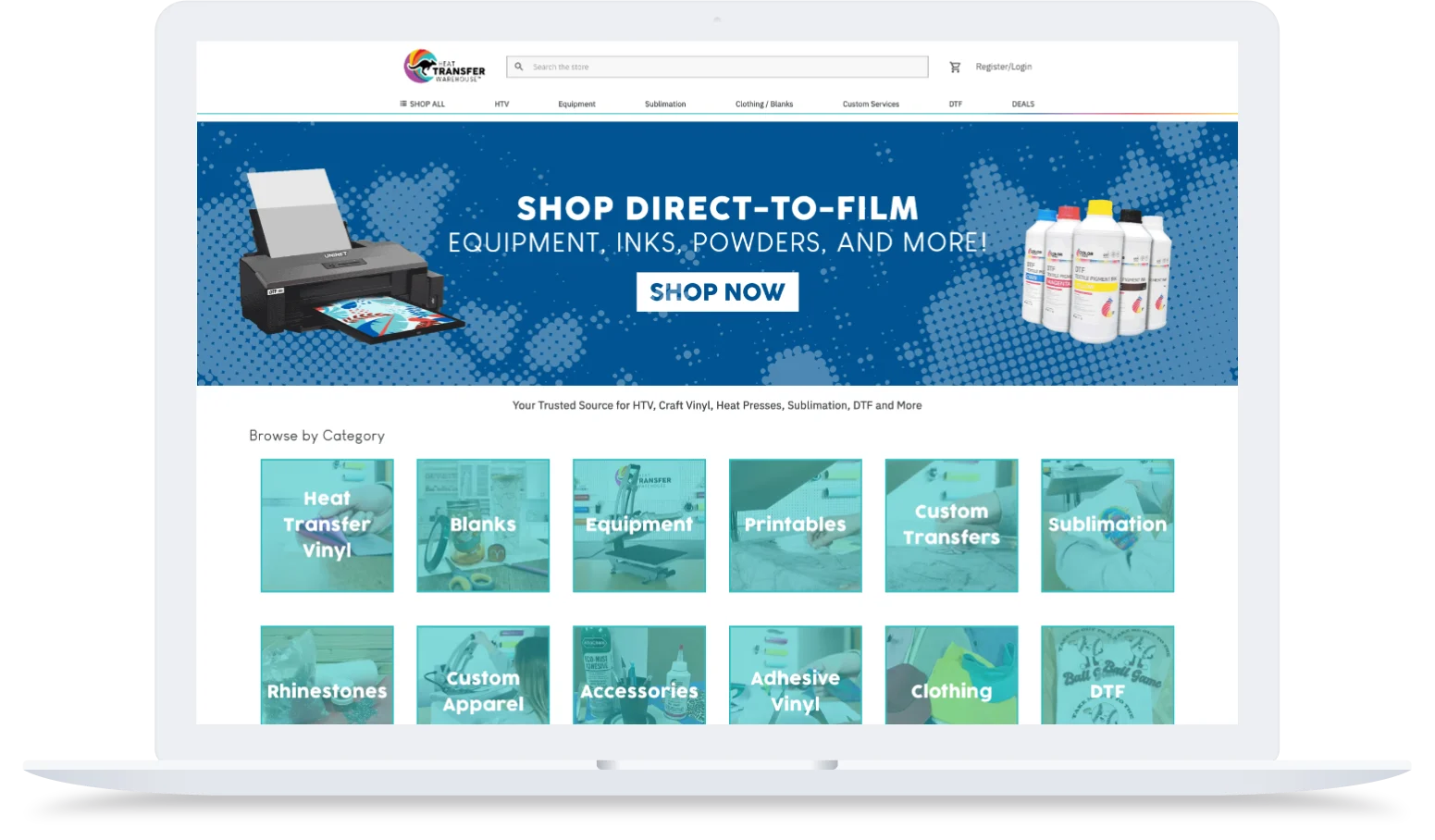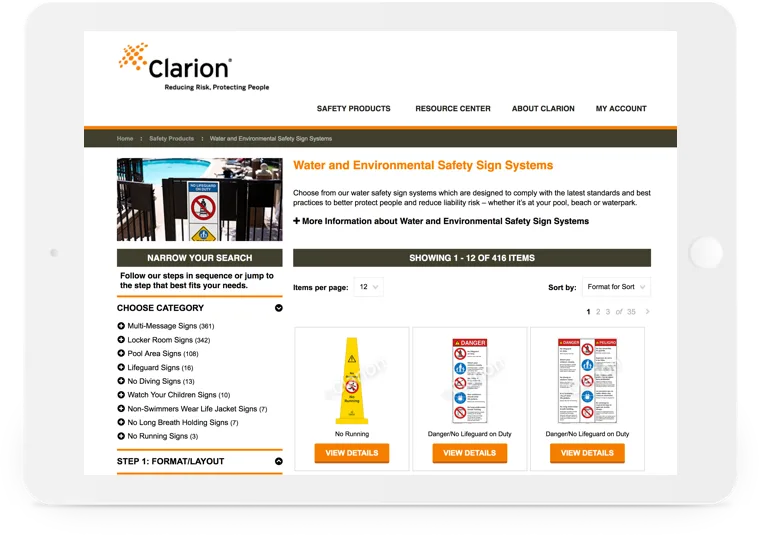
Industrial Ecommerce
Get The Print Version
Tired of scrolling? Download a PDF version for easier offline reading and sharing with coworkers.
A link to download the PDF will arrive in your inbox shortly.
Though industrial companies selling extruded hoses, fasteners and ball bearings may be considered “unsexy” or “boring” to consumers, buyers of industrial goods play a vital role in the U.S. economy.
In 2022, manufacturing businesses contributed $2.3 trillion to U.S. GDP. When including business-to-business purchases (B2B) from other industries, (direct and indirect), the manufacturing industry contributed an estimated 24% of GDP.
The industrial sector is investing in digital transformation
While adoption rates may have lagged behind retail and consumer goods companies, industrial ecommerce is a huge driver for growth and profitability. Customer demand has led many industrial producers to conduct business online and expand their digital footprint.
According to Digital Commerce 360, B2B ecommerce sales will account for a projected 16% of all manufacturing and distribution sales in 2024. By 2025, 56% of their revenue is expected to come from digital channels.
Digital channels are also used for product discovery. B2B industrial buyers now expect B2C-like customer experiences online. And B2B ecommerce platforms are uniquely suited to meet those expectations.
A good B2B website is the best salesperson a company could ever want — it nurtures leads over a long sales cycle and provides complex technical information buyers want.
When done right, an industrial ecommerce website lets the buyer make an informed decision without ever talking to a sales rep. By 2025, Gartner predicts that 80% of B2B sales interactions between buyers and suppliers will occur in digital channels.
Industrial ecommerce best practices to follow
Industrial companies are embracing digital transformation in a big way. Generational expectations play a big role in this evolution. More and more B2B industrial buyers are Millennials who want a touchless experience through the purchase process.
Here are some ways to appeal to these online natives.
Frictionless customer experience.
Industrial ecommerce companies can personalize the customer journey by researching the client’s industry, procurement process and unique needs.
Meeting customer needs includes providing personalized product recommendations, detailed product information, and ongoing content to educate customers about the product is essential to any B2B transaction.
Transparent pricing and custom quote generation build trust by ensuring customers only pay for what they need.
Robust security and fraud prevention.
B2B companies deal with sensitive information, such as financial data, intellectual property and confidential information belonging to other businesses. Additionally, the average order value for a B2B transaction is much higher than B2C, making B2B businesses an attractive target for wire fraud.
Fraud prevention measures, such as two-factor authentication, transaction monitoring, and anti-phishing measures can prevent cyberattacks.
Omnichannel presence.
An omnichannel presence means meeting customers’ needs in their preferred digital channel and providing a unified customer experience across channels. For industrial ecommerce businesses, this means providing a frictionless customer experience through their website, social media and email.
A presence in offline channels, such as tradeshows or brick-and-mortar stores, can cement a customer relationship with additional touchpoints.
An omnichannel presence also requires seamless data integration between channels — meaning your CRM system is connected to your ecommerce website, social media, inventory management software and other systems to monitor real-time updates across channels.
Social commerce.
Establishing a social media presence creates opportunities for social commerce. Here are some ways sellers of industrial goods and services can use social media to drive sales:
Showcase products: Social media platforms, such as Facebook, enable brands to set up storefronts to showcase products, including product information and pricing.
Build relationships: B2B businesses often use professional social networking sites, like LinkedIn, to identify decision-makers at target companies, build relationships and schedule sales calls with new customers.
Provide customer support: Customer satisfaction scores go up when businesses provide live support or chatbots and schedule appointments through messaging services on social media platforms.
Advertising: Social media ads enable businesses to target audiences based on demographics and interests and tap new markets
Build brand awareness: Posting on social media builds brand awareness and increases website traffic, leading to conversions.
Integrated ERP solutions.
ERP solutions provide a central database for all business intelligence, delivering real-time updates on sales trends, customer behavior and inventory turnover. This data empowers businesses to identify inefficiencies, reduce costs and improve business processes.
To reach its full potential, an ERP solution must be fully integrated within the organization’s technology stack — including email marketing software, accounting software, a CRM system and other software systems.
Data-driven decision-making.
Data-driven decisions are grounded in truth rather than intuition and help businesses optimize their operations and profitability. Here are some examples of data-driven decisions businesses can make:
Pricing: By analyzing data on total sales volume, customer behavior and market trends, ecommerce companies can make informed pricing decisions. For example, they may adjust prices to optimize profitability, offer discounts to encourage digital sales or adjust prices to match competitors.
Inventory management: Businesses can avoid stockouts or overstocks, reduce inventory carrying costs and prioritize certain products based on customer demand using data on inventory levels, lead times and sales volume.
Marketing: Data insights enable businesses to focus their marketing budget on channels generating the highest ROI and A/B test different strategies.
Supply chain: Data on lead times, delivery times and supplier performance lets businesses choose suppliers based on performance metrics and optimize delivery routes to reduce shipping costs.
Customer service: Customer behavioral data reveals website activity, purchasing habits and key metrics like customer lifetime value. This shows businesses where they can improve the customer experience and reward loyal customers.
Streamlined supply chain management.
A centralized inventory management system lets businesses track inventory levels, orders and deliveries from a single platform. This provides insight into supplier performance and the order fulfillment process.
Here are some ways industrial ecommerce businesses can streamline supply chain management:
Real-time tracking: RFID tags and barcodes enable businesses to track inventory and shipments in real-time, improving visibility across the supply chain.
Work with reliable suppliers: Ecommerce businesses can monitor data on supplier performance to prioritize suppliers and distributors with a proven track record of delivering high-quality products on time.
Optimize logistics and transportation: Real-time logistics data lets businesses choose the most cost-effective delivery routes and shipping partners.
Automated order processing: Order processing tools track inventory levels, process payments and track order delivery, reducing the chances of error.
The future of industrial ecommerce
The industrial sector is increasingly investing in digital transformation to remain competitive, improve operational efficiency, and adapt to rapidly changing market conditions. Here's a breakdown of how they are investing in this transformation.
Increasing adoption of mobile.
Mobile devices are an important touchpoint in B2B transactions. Given that half of all B2B inquiries now come from mobile devices, having a mobile-friendly ecommerce platform is no longer a luxury — it's a necessity.
B2B buyers typically engage with around 10 sales channels when researching products or service providers. There’s a noticeable trend toward channels centered around mobile platforms. Industrial businesses that fine-tune their ecommerce platforms for mobile-savvy buyers are tapping a vast market of professionals seeking solutions at their fingertips.
Whether you are selling industrial equipment, manufactured parts through a distributor network or drop shipping products worldwide, your customers expect seamless experiences on their phones and tablets.
In addition to building a responsive website, B2B ecommerce brands could offer a companion mobile app where users can make purchases, contact customer support and receive push notifications for order tracking and personalized recommendations.
AI and industrial ecommerce.
AI provides new opportunities for industrial commerce companies to streamline operations, automate processes, tailor customer journeys and implement personalization at scale.
Here are some use cases:
Personalized product recommendations: AI-powered recommendation engines provide personalized recommendations based on customers’ browsing and purchase history.
Chatbots: Chatbots can provide customer support by answering FAQs, resolving issues and collecting information before handing the customer off to a live agent.
Predictive maintenance: AI algorithms analyze data from sensors to predict when industrial equipment needs maintenance. This reduces the risk of unplanned downtime and stockouts.
Inventory management: Inventory management software analyzes ecommerce sales data to predict demand and optimize inventory levels.
Supply chain optimization: AI algorithms analyze data on shipping times, delivery routes and carrier performance to reduce costs and improve the customer experience.
Whether you’re an early adopter or new to AI, our suite of AI-powered tools and partner integrations offer something for everyone.
From optimized product descriptions to personalized shopping, BigAI is designed to improve discoverability, boost engagement, streamline operations and help you find new creative ways to attract and convert more customers.
Rise of subscription-based models.
Subscription-based business models compel companies to build lasting relationships with customers to generate recurring revenue. While the average order value is lower, subscription models create opportunities for higher average customer lifetime value. Predictable demand from a subscription business can help streamline inventory management.
Sustainable supply chain sourcing.
B2B customers increasingly prefer to partner with companies that minimize environmental impact. This means optimizing delivery routes to reduce carbon footprint, eliminating unnecessary packaging and ensuring manufacturing plants and other physical facilities adhere to green building codes.
It also means refusing to do business with unethical suppliers.
Headless commerce.
Headless commerce is an ecommerce architecture that separates the front-end user interface from the back-end ecommerce platform, allowing for greater customization and performance across multiple touchpoints.
Headless commerce has several advantages for industrial commerce businesses:
Business continuity: Companies can quickly deploy new front-end experiences without disrupting the backend (i.e. no downtime).
Personalization: The front end can be customized to deliver relevant content based on individual customer data.
Better user experience: Build seamless user experiences across different devices and touchpoints including desktop, mobile and smart devices.
Easier integration: Integrate other software systems for a unified view of customer data.

Ebook: B2B Digital Maturity Guide
Discover your maturity level as a B2B storefront and learn how you can improve.
Examples of industrial ecommerce websites
Industrial ecommerce companies supply businesses across various industries with products used for equipment maintenance or manufacturing. The best industrial websites strive to build relationships with customers and give them up-to-date information.
You will recognize exceptional websites by the way they integrate customer reviews, marketing automation, on-site search, appointment management and more. They also pay attention to page speed since so many prospects and customers first visit a web page using a mobile device.
Following are a few examples.
Tradelink.

Australia’s oldest plumbing merchant, Tradelink produces plumbing products and appliances for bathrooms, kitchens, laundry rooms and more. At Tradelink showrooms, skilled sales reps consult with customers to find the best products for their home renovations. Customers can also request quotes and book a free consultation via Facebook Messenger.
Heat Transfer Warehouse.

Case Study: Heat Transfer Warehouse
Since opening its doors in 2010, Heat Transfer Warehouse has established a strong B2B and B2C presence. More recently, they’ve tapped into the DTC sector through their acquisition of Shirts From Fargo, a custom t-shirt and embroidery company. Their foothold in these three areas has allowed them to have full-circle involvement in the world of custom product decoration.
USCutter.

Known for its vinyl-cutting products, USCutter is a maker of vinyl products, digital printers, flatbed cutters and other goods. The website offers educational content, including case studies, video tutorials on product use, news articles, and a forum for customers to ask questions.
Ballard Industrial.

Case Study: Ballard Industrial
Ballard Industrial works to supply tangible solutions for its B2B and DTC audiences, expanding into a 45,000-square-foot warehouse, serving marine, manufacturing, and industrial customers across the country. Driven by “a deliberate intention to resolve and respond to our customer's problems,” Ballard Industrial knew it needed an ecommerce platform that would do the same for them.
Clarion Safety Systems.

Case Study: Clarion Safety Systems
Clarion Safety Systems has been in the B2B market for more than 25 years as a designer and manufacturer of product safety labels and signage. When they found out that their order processing system could no longer support online sales, they knew they needed to find a new solution. Now, customers can customize products and request a quote online. They can also contact customer support via webchat.
Fastfix.

Fastfix is no stranger to tool-using professionals and do-it-yourselfers in the United Kingdom. This 30-year-old company has seen a lot of change and has successfully adapted. The company provides one-hour delivery slots with alerts via text and email so customers know when to expect items. Customer reviews from Trustpilot provide crucial social proof and their product page emphasizes technical specs and use cases, giving customers essential information to make an informed decision.
TYGRIS.

Tygris makes anti-corrosion products designed to withstand hostile environments and improve the performance of metal components. A quick order pad allows buyers to search for products by their codes and a price quotation system. The purchase order feature enables better control and tracking of order details. In addition, customers can request custom quotes online and learn more about product usage through Tygris Academy.
How BigCommerce helps industrial companies
Industrial ecommerce businesses need robust, highly customizable ecommerce solutions that grow with them. Designed for scalability, the BigCommerce platform can handle large product catalogs, high traffic volume and complex integrations.
As a headless ecommerce platform, BigCommerce provides a range of customization options, including modular storefronts, customizable checkout, and integrations with popular third-party tools.
BigCommerce supports various sales channels, including online marketplaces, social media platforms and point-of-sale (POS) systems, allowing businesses to reach customers wherever they are. Additionally, BigCommerce is PCI DSS-compliant and includes advanced security features such as fraud detection and prevention, two-factor authentication, and SSL encryption.
With best-in-breed analytics and reporting, businesses can track their performance and make data-driven decisions.
Industry-leading B2B ecommerce capabilities.
Our robust platform is tailored to meet the unique needs of B2B sellers and buyers, offering a comprehensive suite of features to drive online success. Here are some of the best-in-class capabilities that will leave your competitors in the dust.
Create a beautiful site.
The days of boring static brochure websites are long gone. Industrial websites have merged the visual appeal of B2C sites with state-of-the-art functionality that sophisticated B2B buyers demand. The beauty of using BigCommerce is that your new and improved storefront is just a drag-and-drop away.
Offer a seamless checkout experience.
In the complex world of B2B industrial ecommerce, customers crave a seamless checkout experience. The customer journey should be easy. Better yet, it should feel easy. That visitor conversion rate — the journey from site visit to order — is what BigCommerce is thriving in, according to Incisiv.
Integrate to back-end systems.
While frontends serve as an ecommerce store’s front porch, it’s the backend that serves as the foundation that keeps the whole site working. A strong ecommerce backend can save resources, reduce costs and avoid costly downtime.
Flexible payment options.
Making it easy for customers to pay you means fewer items left in shopping carts. A best-in-class payment solution that accepts a variety of payment methods means more completed sales. Stripe, for example, is a great way to accept payments online and one of the easiest payment gateways to set up with BigCommerce.
Industry-leading performance and security.
Security is vitally important, especially if you’re storing customer data. You should aim to meet the highest ecommerce standards — because the alternative could be disastrous. Providing regular updates to performance, security and design keeps the site refreshed and in a constant state of improvement.
BigCommerce has delivered 100% uptime during every cyber week since 2016 and 99.98%+ since 2009. In addition to industry-leading site performance, earning the prestigious PCI DSS 4.1 Level 1 Attestation of Compliance, ISO/IEC 27001:2022, ISO/IEC 27701:2019, ISO 22301:2019, ISO/IEC 27017:2015, ISO/IEC 27018:2019 is another accolade we’re proud to share.
The final word
Industrial ecommerce companies face pressure to deliver a digital experience on par with B2C businesses. To stay competitive, manufacturers and distributors can adopt an omnichannel strategy, offer self-service options and apply digital marketing and SEO to grow their customer base.
In industrial ecommerce, products must be customizable to meet each business's needs. Because the sales cycle is longer due to complex procurement and multiple stakeholders, they must tailor the customer journey to align with various stages of the decision-making process.
FAQs about industrial ecommerce
Industrial ecommerce typically involves the sale of goods used in industrial applications such as manufacturing, construction and maintenance. Examples of industrial products include:
Industrial machinery and equipment: From heavy equipment like bulldozers and cranes to specialized machinery like milling machines.
Supplies and components: Items like bearings, belts, motors and pumps as well as raw materials like metals, plastics and chemicals.
Personal protective equipment (PPE): Hard hats, safety glasses and masks to specialized equipment like fall protection gear.
Electrical components: Circuit breakers, transformers and sensors or specialized components.
Maintenance, repair and operations (MRO) products: Products used for maintenance and repair activities including lubricants, adhesives, cleaning products and general office supplies.
An effective industrial ecommerce platform should have a range of features for managing online sales.
Product catalog management: Product catalogs are a central repository for updating and maintaining product information across digital channels.
Order management: Order processing and fulfillment to shipment tracking and returns management.
Pricing: Custom quote generation, dynamic pricing, volume discounts and contract pricing.
Inventory management: Track inventory levels and manage stock efficiently.
Integrations: API integrations enable different systems and applications to exchange data, such as your payment gateway and accounting software.
Security: A digital commerce platform should include security features such as SSL encryption, fraud detection and PCI compliance.
Analytics and reporting: Analytics and reporting tools to monitor KPIs and identify areas for improvement.
Industrial ecommerce businesses must safeguard their systems from payment fraud, data breaches and malware — including phishing attacks and distributed denial-of-service (DDoS) attacks.
Cybercriminals often attempt to impersonate a legitimate business by spoofing their phone number, email address or website. Ecommerce businesses must warn their customers about such attacks.
Furthermore, industrial ecommerce businesses often rely on complex supply chains; any vulnerabilities within supply chains pose a security risk.

Get a proposal for a custom ecommerce plan.
Our highly-skilled service teams that are experts at growing ecommerce businesses. Reach out to get a personalized proposal.




